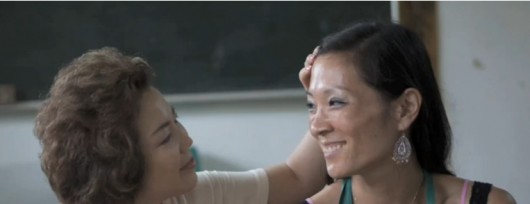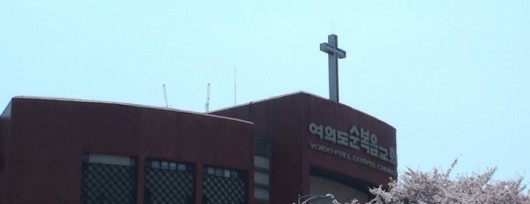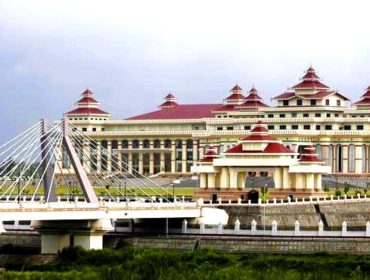By Kevin Kudic
 GYEONGGI-DO, ILSAN-At first glance Mr. Jung seems to be your typical purveyor of mandu, but a closer look reveals a spark of individuality that separates him from the clones of proprietors that own these small types of restaurants. Outside, the bleak Seoul winter has already begun. Two or three customers seeking refuge pop their heads in the restaurant and casually survey inside to see if the place is still open. Mr. Jung takes care of them. He is ready. There is a gleam in his eye as he takes a seat opposite from us. On the table there is a book titled Kwangsoo’s Thoughts in English. “This is a particular story that made a deep impression on me” he says, thumbing through the pages. The book is a primer that uses humorous anecdotes on life in comic book format to teach English. He fumbles through the pages a little, finds the page he is looking for and begins reading:
GYEONGGI-DO, ILSAN-At first glance Mr. Jung seems to be your typical purveyor of mandu, but a closer look reveals a spark of individuality that separates him from the clones of proprietors that own these small types of restaurants. Outside, the bleak Seoul winter has already begun. Two or three customers seeking refuge pop their heads in the restaurant and casually survey inside to see if the place is still open. Mr. Jung takes care of them. He is ready. There is a gleam in his eye as he takes a seat opposite from us. On the table there is a book titled Kwangsoo’s Thoughts in English. “This is a particular story that made a deep impression on me” he says, thumbing through the pages. The book is a primer that uses humorous anecdotes on life in comic book format to teach English. He fumbles through the pages a little, finds the page he is looking for and begins reading:
“Dad did nothing but listened to the radio after his honorary retirement…”
Mr. Jung was born in Jeollanamdo in the city of Naju, far south of Seoul, considered the cradle of Korean cuisine and birthplace of the Joseon dynasty. In the region of Jeollado, which lies directly north, bibimbap is said to have originated from the city of Jeonju. The post-war poverty conditions imbued him with a sense of responsibility, as did many other Koreans that grew up during that era. He is eponymous with the traditional Korean spirit of hard work and labor, but his lifestyle is not entirely ascetic. Mr. Jung enjoys life and wants to make money. He is interested in business, in the country’s commercial and financial success, and sees it as a symbol of a rising Korea that will grow in the next twenty years or so. “Some research institute in American announced that Korea will be the second most powerful country in the world in twenty years” he notes. Mr. Jung has an optimistic view of the future in Korea and it coincides with the collective energizing spirit of industry and labor that has propelled the country into the top ranks of world powers. The country is resting on its laurels, and he utters the same kind of platitudes that any blue-blooded Korean will tell you. “Our country has been booming, we have companies like Samsung that ten years ago weren’t even looked at, and now the company is better than some Japanese companies,we can’t survive if we’re lazy. Our education boom is creating these smart individuals that will pull the country forward, these kids will grow up and start new trends, new ways of thinking. Now, the semiconductor technology is one of the most advanced.”
Mr. Jung’s tale converges with the country’s economic ascent from post-war Bangladeshi poverty levels to a standard of living that rivals Germany. It is the blueprint for how he lives his life. After dropping out of school he had to find ways of providing for his family. “Because I was raised in the country in a poor family I had to work to earn money. I finished middle school and dropped out to make money. So, a restaurant was the only place where you can eat and earn money, and that was how I learned how to cook.”
The situation took a turn for the worse from the untimely death of his father at eighteen years of age. He quickly realized that cooking, which would turn out to be his true calling, was the only means of survival. His interest in it developed out of a need, and that in turn bloomed into a life that valued the art. He reflects soberly on the hard knocks of his apprenticeship. “These days there are a lot of books and references on that, and you can learn cooking easily. But twenty years ago, there was none of that. I basically picked up the cooking skills by ear, but I didn’t just cook. I had to do a lot of menial work like washing the main chef’s socks, underwear, all of that. It was very hard.” Mr. Jung’s flight from country to city is part of the exodus where, from 1945 to 1985, the urban population of South Korea grew from 14.5 percent to 65.4 percent of the total population. “There must have been so many people like me” he says.
“One day Dad, who was listening to the radio as usual, suddenly started sobbing quietly.”
Mr. Jung’s hard work and perseverance also flow into other avenues of his life as well. His passion for English gives him a sense of personality that foreigners can quickly grasp. Mr. Jung’s place is perfect for foreigners that want a nosh to eat. He is always amiable, hospitable, and always goes out of his way to make sure you are comfortable. I once jokingly told him that he should change the name of his restaurant to Mr. J’s to reflect that sense of unique identity that he emits. He laughed and said he would think about it. What you’ll see instead as you reach the corner is a sign that is ungraciously shared with a real-estate agency; the bottom half of the sign reads bun-shik, a style of restaurant that specializes in fixing various types of quick meals. The interior of Jung’s restaurant: yellow flower pattern stained wallpaper, the same stock photos of food that every bun-shik style restaurant has, the upright chairs, the austere wooden tables. Indeed, the atmosphere is humble like the man, but here is the closest thing to a diner experience you will ever get in Korea, and Mr. Jung’s food is the closest equivalent that I have ever gotten to eating a home-cooked meal. And if it’s one thing Mr. Jung knows much about, it’s food, not just the intricacies of Korean gastronomy, but the holistic concept of food as medicine for the soul. “When it comes to Asian and Western food cultures, the effects of food on your body is huge. When it comes to Korean food, or han-shik, it reflects the past. Koreans for a very long time couldn’t eat meat, and Westerners have been eating lots of meat for a very long time, so if you compare Asian and Western body types, they’re different. Westerners have these big bodies and Asians are very small, and this is because our bodies have been changed by the food. If you can get the best of both worlds it would be perfect.” There is no universal scale that determines what everybody should eat, but rather history and culture that is the compass pointing us in the right direction. Does Mr. Jung have the perfect culinary embodiment of Eastern and Western food values? “There is no perfect answer to that. Every person is different, depending on the situation. If a healthy person with a healthy liver eats a certain food that is good for the liver, it doesn’t really make a difference. We have to eat food that fixes ailing parts of our body.”
A people’s culture and history is reflected by the food eaten, and sometimes history can provide the catalyst for ingenuity necessary to survive. During post-war recovery, an unprecedented level of poverty swept the country, and people were desperate to find any means necessary to stave the hunger. That circumstance is what created buddae-jiggae: a thick spicy soup dish made of traditional Korean ingredients and surplus war rations of spam and canned sausages. It is a kind of poetic hybridization that rings true with Chris Rock’s observation, “It’s the same philosophy of soul food-they gave us the scraps and we made it into cuisine.” This amalgamation is one point that Mr. Jung is very giddy to make. At one point, we take out a map and locate the country, and can’t help but notice even more than usual its geography etched into the landscape forever sealing its destiny: the neglected middle child of China and Japan. But Mr. Jung is intent on disabusing me of that notion and begins to draw three different cutting knives. The Japanese blade is long, the Chinese one is short and stocky, and the Korean one is a kind of a fusion of these two. “So, if you look at these three different knives, and I’m not trying to boast, it’ll tell you that Koreans had to be pretty smart. The Korean knife in the middle has two functions. The Chinese knife is for vegetables, the Japanese knife is for fish, but the Korean one can be used for both. Just by looking at this knife, you can see that Koreans were really clever. It’s really not a boast, but history.”
At this point, the growth in Korea is way past the point of boasting and has become fact. One of the biggest industries running the country is the hagwon, or private cram school system that has been at loggerheads with the education bureaucracy. The cultural shift, however, is changing from an educational paradigm that stressed high scores on standardized tests, such as TOEFL and TOEIC, to a broader based campaign that takes into account extra-curricular activities devoted to English. Although this would seem to signal a more intuitive approach to learning English, the fickleness of English pedagogy in the country has been a rancorous issue and any consensus on the matter has been futile.
“His sobbing got louder and louder. Without knowing anything, we approached Dad.”
 “I really don’t remember how I learned English” Mr. Jung says. “I couldn’t speak a drop of English in the beginning. I started studying when I was living in Ilsan and working in Seoul. There was a free newspaper that had a small section for learning English, and that was the start of my foundation. Eventually, I opened the restaurant and it was talking to Andrew ( a local customer) that really made me confident in learning more English. He was one of the more familiar faces, very friendly; I just started talking to him more and more and we built this relationship together. I only started with a few basic sentences, and usually it’s scary for Koreans to interact with foreigners, but Andrew was a customer and he was such a nice guy.”
“I really don’t remember how I learned English” Mr. Jung says. “I couldn’t speak a drop of English in the beginning. I started studying when I was living in Ilsan and working in Seoul. There was a free newspaper that had a small section for learning English, and that was the start of my foundation. Eventually, I opened the restaurant and it was talking to Andrew ( a local customer) that really made me confident in learning more English. He was one of the more familiar faces, very friendly; I just started talking to him more and more and we built this relationship together. I only started with a few basic sentences, and usually it’s scary for Koreans to interact with foreigners, but Andrew was a customer and he was such a nice guy.”
It is a common sense approach that highlights how he has lived his life. In Hugok Village, a collection of apartment buildings, there is a main road that is flanked on either side by a cluster of buildings that house a honeycomb complex of hagwons. Most of the academies’ methods in teaching English reflect the priority of test scores, and so the process of learning a language has nothing to do with learning it naturally or learning it for pleasure. It is purely for academic achievement, which reduces a language so rich and dynamic as English as merely a kind of dead language with a certain set of rules to be memorized by rote and to be regurgitated at the time of a test. It is a multi-trillion won industry for Korea, and rankles the preexisting public education sector that has been foaming at the mouth over the huge reaps in profits from these hagwons. Mr. Jung’s method suggests a balanced approach. “Learning English in a classroom is just learning grammar and sentence structure. But real life is unpredictable, we have to study real situations not hypothetical ones. You have to be able to learn how to live life. Personally, I would prefer ‘life English.’ There has to be a time when English is comfortable in the classroom. I’m personally satisfied with the way that I learned English. I was able to use it to help other foreigners. Teachers should make students feel comfortable in the classroom.” Mr. Jung has a daughter that goes to an academy located right above the restaurant. Sometimes she glides into the restaurant on her roller blades. Like many of my students, she is painfully shy when it comes to interacting in English. I say hello to her, and she strains a faint hello, exhaled like a puff of air that condenses much too fast for any kind of resonance to be heard. She leans into the crook of her father’s arm, that one “hello” sapping her strength.
“In front of him, there was a part fallen from the radio. Obviously the part came from the main body of the radio somewhere, but it was still working all right. I wonder if Dad saw the present figure of himself as the fallen part. ‘You are just like me. You are just like me.’ So saying, he cried for a long time.”
We close the book, and for a second I think that Mr. Jung has a tear in his eye. The glassy eyed appearance, and the delicate shape is a result of a traffic accident Mr. Jung experienced while on a delivery route almost a year ago which forced him to be hospitalized for a month. It required a vein bypass surgery on his right eye after the main vein was shattered. The screw in the picture suddenly flares up as if it were an illuminated manuscript. Everything loses focus as the details of the screw become clear. Assembled back into the radio, each turn twisting the tension, the coils of tension that have shaped this peninsula and will continue to shape it for years to come. Many things come to mind; the attack on Yeonpyeong island, and the military drills at full force even amidst the retaliatory capabilities of the North, the smell of mandu outside; the billowing clouds burbling out of the pots inviting one to come in and dine smothered in the warmth of the radiator fans. If Mr. Jung is the screw, what is the radio? I ask Mr. Jung. The world, he says. “ I think of myself as part of the world, and I think about death. Especially when I think about that screw. I feel that like the screw in the story, sometimes I feel useless, and without me the world would work just fine. But, somehow there is somebody that needs me. In living my life, there is someone that is able to live with my help. And because of this I must live my life.”
The T.V is on during the interview and I rue not turning it off, but it is hard to imagine having conversations with Koreans without the flickering of images, each one dying like mayflies; each effervescent image dying and coalescing into each other. A nondescript anchor decides to chat and talk about war in the most sterile way possible. Mr. Jung also has thoughts about war. “You know I talk about these things, and I have these silly notions of evil villains taking over the world like a bad sci-fi movie, but it scares me to think about that because it can really happen. We have the technology to change the trajec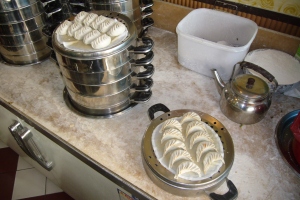 tory of missiles. It’s really like a sci-fi film but it’s really happening. Things like this really turn me off to living a long life.” And as he says this I think to myself, but you have to live and make mandu for people that are hungry. And in saying this I am not being ironic, because Mr. Jung’s scar is the reaffirming note. As I look at the scar, the legacy from his accident, I am reminded of war veterans, someone that has seen the plains of battlefields, has seen death and has not shirked from it, but has embraced it as a lover.
tory of missiles. It’s really like a sci-fi film but it’s really happening. Things like this really turn me off to living a long life.” And as he says this I think to myself, but you have to live and make mandu for people that are hungry. And in saying this I am not being ironic, because Mr. Jung’s scar is the reaffirming note. As I look at the scar, the legacy from his accident, I am reminded of war veterans, someone that has seen the plains of battlefields, has seen death and has not shirked from it, but has embraced it as a lover.
As lovers embrace each other in this dry, harsh Seoul climate I slyly ask Mr. Jung about a second chance at love, and he cooly replies “if someone appeared to me, a pretty woman, I would get married.” Behind the curtain of steam that emanates from the mandu pots-she just might be there.
______________________________________________________________________________
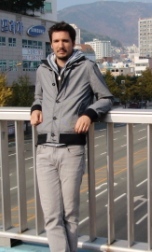 Kevin Kudic teaches at Seoul Language Institute in Ilsan. He’s currently working on a Korean/English blog called Seoul Stomp-www.seoulstomp.wordpress.com. He can be reached at KKudic@gmail.com.
Kevin Kudic teaches at Seoul Language Institute in Ilsan. He’s currently working on a Korean/English blog called Seoul Stomp-www.seoulstomp.wordpress.com. He can be reached at KKudic@gmail.com.
음식으로부터의 사색
만두아저씨와 친해지기
경기도 일산. 정씨의 첫인상은 전형적인 분식집 주방장이지만 가까이 다가가면 번득이는 개성을 뿜어낸다. 이런 작은 식당을 가진 모두 똑같은 모습의 주방장들과는 동떨어진 모습이다. 밖에는 서울의 차디찬 겨울이 벌써 시작 되었다. 손님 둘, 셋이 머리만 식당 안으로 쑥 내밀고 아직도 열려 있는지 쓱 둘러 본다. 정씨는 준비되어 있다. 우리 맞은편에 앉으며 눈을 반짝였다. 식탁에는 <광수생각> 영어판이 놓여 있었다. “이 부분이 가장 감동적이었어요.” 정씨가 책장을 휙휙 넘기며 말했다. 일상의 유머스러운 일화를 만화 형태로 싣은 기초 영어 책이었다. 잠시 책장을 뒤적이던 정시는 한 페이지를 펼쳤다. 그리고 읽기 시작했다.
“아버지는 명예퇴직후 집에서 라디오만 들으셨다. 조금은 아버지의 힘없는 모습에 화가 나기도 했다.”
정씨는 서울에서 멀리 떨어진 전라남도 나주시에서 태어났다. 한국 음식의 발생지이며 조선 왕조가 탄생했다고 알려져있는 곳이다. 그 바로 북쪽, 역시 전라도에 자리한 전주시에서는 전형적 한국 음식인 비빔밥이 발명되었다고들 말한다. 그 시대에 자란 많은 한국인들이 그랬던 것 처럼, 정씨에게도 전쟁 후 빈곤했던 형편이 남긴 강한 책임감이 스며들어 있다. 고된 노동을 하는 전통적 한국인 정신이 밑바탕에 깔려있다. 그렇다고 정씨의 인생이 완전히 금욕적이었던 것만은 아니다. 인생을 즐기고 돈을 벌고 싶어한다. 개인 사업과 국가의 상업, 금융 성과에 관심을 가지고 있고, 이를 한국을 이십년 안에 세계 두번째 강대국으로 끌어 올릴 상징으로 본다. “미국의 어떤 연구 기관이 한국이 이십년 안에 세계 두번째 강대국이 될 거라는 발표를 한 적 있어요.” 정씨는 한국의 미래에 대해 낙관적인 전망을 가지고 있다. 이런 전망은 한국을 세계 강대국 상위권으로 밀어주고자 다함께 기운을 돋우는 산업과 노동력의 정신을 내포하고 있다. 한국은 승리의 그늘에서 휴식을 취하고 있다. 정씨는 순수 한국인이라면 누구나 말해줄 상투적인 의견을 꺼냈다. “우리 나라는 급속히 발전해 왔어요. 십년 전에는 알아주지도 않았지만 지금은 일본의 몇몇 회사들보다 뛰어난 삼성이 있죠…우리는 게으르면 살아남을 수 없어요. 우리의 교육 열풍은 나라를 이끌어갈 인재를 키워내고 있어요. 이 아이들이 자라나면 새로운 길, 새로운 생각을 열어갈 거에요. 반도체 기술은 이제 세계에서 가장 뛰어난 축에 속하죠.”
정씨는 나라 경제가 전쟁 후 방글라데시 수준의 빈곤에서 독일에 견줄만한 표준 생활 수준으로 상승했다는 쪽으로 이야기를 모았다. 바로 정씨가 인생을 살아가는 모습을 그린 청사진이다. 학교를 그만둔 뒤 정씨는 어떻게든 식구를 먹여살릴 방법을 찾아야 했다. “시골 가난한 집에서 자랐기 때문에 일해서 돈을 벌어야 했어요. 중학교를 졸업하고 돈을 별기 위해 학교를 그만 뒀죠. 식당이 밥도 먹고 돈도 벌고 잠도 잘 수 있는 유일한 곳이었요. 그곳에서 요리하는 법을 배웠어요.”
이러한 상황은 열여덟살 아버지가 갑작스레 세상을 떠나며 더욱 나빠졌다. 정씨는 곧바로 이후에 천직이 되어 버린 요리만이 생존을 의미한 다는 것을 깨닳았다. 살아남기 위해 요리에 흥미를 갖았고, 이 예술적인 일에 감사하는 삶으로 꽃피웠다. 정씨는 역경이 가득했던 견습생 시절을 진지하게 되세겼다. “요즘에는 책도 많고 인터넷도 있고 하다보니 쉽게 배울 수 있지만 20년 전에는 입으로 입으로 전수를 받았죠. 요리만 한 것이 아니라 주방장들 속옷도 빨아주고 양말도 빨아주고. 아주 힘들었어요.” 정씨가 시골에서 도시로 이사한 것은 1945년 에서 1985년 사이에 일어났던 이농 현상이 일어날 때였다. 이때 도시 인구가 전체 인구의 14.5%에서 65.4%까지 상승했다. “나 같은 사람들이 많을 거에요.”
“그러던 어느날이었다. 언제나 처럼 라디오를 들으시던 아버지가 조그맣게 흐느끼기 시작했다.”
정씨의 굳은 노력과 인내는 인생의 다른 길로도 잘 흘러 들어 갔다. 영어에 대한 열정으로 외국인으로 하여금 쉽게 다가갈 수 있게 하는 인간적 매력을 얻었다. 정씨의 식당은 간식거리를 찾는 외국인에게 딱 맞다. 정씨는 항상 붙임성 있고, 친절하며, 언제나 편안하게 해주려 거듭 애를 쓴다. 내가 한 번 식당 이름을 ‘Mr. J’ 으로 바꿔서 정씨가 뿜어내는 독특한 개성을 드러내야 한다고 농담을 던진 적이 있다. 정씨는 웃으며 한번 생각해 보겠다고 했다. 그 식당이 있는 골목으로 다가가면 볼 수 있는 것은 그런 간판 대신 불쾌하게도 부동산과 반반씬 나눠 절반 아래에 ‘분식’이라고 쓰여진 간판이다. ‘분식’은 여러가지 간단한 즉석음식을 전문으로 하는 식당이다. 식당 실내는 노란색 꽃무늬 벽지와 분식집이라면 모두 가지고 있을법한 흔한 음식사진, 반듯한 의자, 단순한 식탁으로 가득하다. 정말 주인처럼 간소한 분위기다. 하지만 한국에서 만날 수 있는 식당 중 고향의 단골집과 가장 가까운 분위기를 느낄 수 있다. 그리고 정씨의 음식은 지금까지 먹어본 음식중 어머니가 만들어준 밥맛에 가장 가깝다. 만약 정씨가 음식에 대해 가장 잘 아는 하나가 있다면 복잡한 한식 요리가 아닌, 영혼의 약으로서 음식이 가진 한의학적 개념일 것이다. “개인적으로 동서양의 음식문화를 말하자면, 서양인이나 동양인이나 음식이 주는 효과는 엄청 커요. 한국 음식에 대해 말하자면, 동양인들은 오래전엔 고기를 많이 못먹었고 대체로 체소를 많이 먹었던 과거를 볼 수 있죠. 반면에 서양인들은 오래전부터 고기를 많이 먹어 왔어요. 동양인과 서양인을 비교해보면 서양인은 뼈대도 강하고 덩치도 큰데, 동양인들은 덩치가 작죠. 생각해보면 사람 몸은 음식에 의해서 변화되잖아요. 그러니까 양쪽 음식의 장점을 다 얻을 수 있다면 참 좋을거에요.” 모든 사람이 무엇을 먹어야 하는지 결정하는 절대 저울은 없지만 바른 방향으로 이끌어주는 나침반인 역사와 문화가 있다. 그렇다면 정씨는 동서양 두 음식의 장점을 완벽하게 조합한 요리법을 가지고 있을까? “완벽한 답은 없어요. 사람에 따라, 상황에 따라 달라요.”
인간이 가진 문화와 역사는 지금까지 먹어온 음식에서 볼 수있다. 그리고 이따금 역사는 살아남기 위해서 독창성에 씨앗을 제공한다. 전쟁에서 회복하는 동안 전례없는 빈곤이 나라를 휩쓸었고, 사람들은 어떻게든 허기를 메우려고 필사적이었다. 이런 환경에서 한국 전통 요리와 전쟁이 남긴 스팸, 소세지를 섞어 만드는 맵고 진한 부대찌개가 만들어졌다. 이는 영혼을 위한 음식을 만드는 방법에 대한 크리스 록 Chris Rock의 기록과 더불어 그럴듯한 시적 혼합이다. “그들은 우리에게 찌꺼기를 주었고 우리는 그것으로 요리를 만들어 냈다. 이는 영혼을 위한 음식의 철학과 같다.” 이런 연금술은 정씨가 신이나 꺼낸 이야기중 하나다. 우리는 지도를 꺼내 한국을 찾았다. 평생 일본과 중국, 형동생 틈에서 외면받는 차남으로 살아갈 운명이 세겨진 지리적 구도가 평소보다도 더 눈에 띄었다. 정씨는 세 종류의 칼을 그리며 내 고정 관념을 깨려 노력했다. 일본의 칼날은 길고, 중국의 칼은 짧고 뭉툭하고, 한국의 칼날은 두 나라의 것을 합쳐 놓은 모양 이었다. “이 세가지 칼을 봐요. 자랑하는건 아니지만 이걸 보면 한국인이 얼마나 똑똑한지 알 수 있을거에요. 이건 중국 칼, 이건 일본칼, 그리고 이게 두게를 합쳐 놓은 한국칼. 중국칼은 채소를 써는데 좋고 일본 칼은 생선을 써는데 좋죠. 그런데 한국 칼은 둘다 쓸 수 있어요. 결코 자랑하는게 아니에요. 이건 역사죠.”
지금 한국의 성장은 자랑할 만한 시기를 한참 지났지만 분명한 사실이다. 이 나라를 움직이는 가장 큰 산업 중 하나는 공교육 체계와 경쟁을 벌이고 있는 학원 시스템이다. 문화적 흐름은 어떻게서든 토익이나 토플같은 획일적인 시험의 높은 점수를 받아 내라고 압력을 넣는 교육 체계에서 영어에 집중하는 과외 활동을 고려하는, 좀 더 광범위한 계획으로 바뀌고 있다. 영어 공부에 대한 좀 더 직관적인 접근을 암시하는 것 처럼 보일수도 있다. 하지만 이 나라의 변덕스러운 영어교육은 여지껏 뜨거운 관심사였고, 문제에 있어 어떤 합의도 모두 헛된 일이었다.
“아버지의 흐느낌은 더욱 커졌다. 우리들은 영문도 모른채 아버지의 옆으로 갔다.”
“정말 어떻게 영어를 배웠는지 기억이 안나요. 처음에는 영어 한마디도 못했거든요. 일산에 살면서 서울로 출퇴근 할 때 공부하기 시작했어요. 지하철 앞에서 나눠주는 공짜 신문 한쪽 구석에 조그만 영어공부란이 있었는데, 거기에서 기초를 시작한 거죠. 결국 식당을 열었고, 앤드류(단골 손님)가 와서 한두마디 하다 보니까 빨리 배워야 겠구나 했죠. 앤드류가 얼굴도 착하게 생기고 친근하잖아요. 난 그냥 한마디 더, 한마디 더 하려다 보니까 친해지게 된 거에요. 처음에는 기초 문장밖에 몰랐어요. 그리고 한국인은 외국인한테 말거는거 무섭잖아요. 근데 앤드류는 손님이고, 워낙 친근하니까.”
아파트 단지가 모여 있는 휴곡 빌라, 큰 길 양 옆으로 늘어선 벌집 같은 복합 학원 빌딩들, 거기에 내가 일하는 학원이 있다. 거의 모든 학원의 영어 교육 규칙은 높은 시험 점수를 말한다. 그렇기에 언어를 배우는 과정에 자연스러움이나, 즐거움은 전혀 쓸데가 없다. 순전히 학업적 성취만을 바랄 뿐이다. 영어처럼 풍부하고 역동적인 언어를 그저 무턱대고 외웠다가 시험에 게워내기 위한, 일련의 규칙이 전부인 죽은 언어로 떨어뜨렸다. 학원은 한국에 수조원을 만들어 주는 거대한 돈벌이 시스템이다. 이런 학원이 만들어 내는 이익이 순식간에 커지는 것을 보고 입에 거품을 물었던 공교육의 눈엣가시다. 정씨의 방식은 균형잡힌 접근을 제안한다. “교실에서 가르치는 영어는 문법이나 문장구조 뿐이에요. 하지만 진짜 생활은 예측불허죠. 상상이 아니라 실제 상황을 공부해야 해요. 어떻게 생활해야 하는지를 배울 수 있어야 하는 거죠. 난 개인적으로 ‘생활 영어’가 중요하다고 생각해요. 교실엔 영어를 편하게 느낄 수 있는 시간이 있어야 해요. 난 개인적으로 내가 영어를 배운 방식에 만족해요. 외국인을 도와줄 수 있었거든요. 선생님은 학생들이 교실을 편안하게 느낄 수 있게 해줘야 해요.”
정씨는 식당 바로 윗층에 자리한 영어학원에 다니는 딸이 하나 있다. 딸은 가끔 롤러브레이드를 타고 식당으로 미끄러져 들어온다. 많은 학생들처럼 영어로 말해야 할 때면 너무나 수줍어한다. 내가 헬로우 하면 비비꼬는 가느다란 소리로 헬로우 한다. 숨 한줌 내쉬듯 말을 꺼내서 알아들을 만한 어떤 울림도 순식간에 흩어져 버린다. 그리곤 그 ‘헬로우’ 한마디를 하는데 진이 빠진 것처럼 아빠 팔뚝에 매달린다.
“아버지 앞에는 라디오에서 떨어져 나온 부속이 하나 있었다. 틀림없이 라디오의 어딘가 붙어 있었을 그 조그만 부속은 본체인 라디오에서 떨어져 나왔지만 라디오는 멀쩡하게 소리가 잘 나고 있었다. 아버지는 본체에서 떨어져 나온 부속을 보고 현재 자신의 모습을 보았던 것일까? ‘너 나와 같구나, 너 나와 같구나’ 하며 아버지는 한참을 울었다.”
책을 덮었다. 나는 잠깐 정씨의 눈에 눈물이 글썽였다고 생각한다. 눈이 예민하게 반짝이는 것은 교통사고를 당한 까닭이다. 거의 일년전 배달 중에 당한 사고로 한 달동안 병원 신세를 졌다. 오른쪽 눈 옆에 손상된 혈관을 다른 혈관으로 바꾸는 수술을 받아야 했다. 갑자기 그림 속 나사가 채색 사본이라도 되는 것처럼 빛났다. 다른 모든 것들은 초점을 잃고 나사만 세세한 부분까지 깨끗하게 보였다. 라디오에 다시 조립되고, 매번 나사를 조일 때마다 더해지는 긴장의 고리가 이 한반도를 빚어낸다. 그리고 앞으로 계속해서 빚어낼 것이다. 마음속에 많은 생각이 찾아든다. 연평도 공격, 북한의 보복 가능성을 안고도 지속한 전력 군사 훈련, 밖에서 들어오는 만두냄새…찜통에서 뿜어져 나오는 소용돌이 수증기 구름이 안으로 들어와 따뜻한 온풍기 바람에 감싸여 저녘밥을 먹고가라며 사람들을 부르고 있다. 만약 자신이 나사라면 이 라디오는 무엇이라 생각하는가, 정씨에게 물었다. 세상. 정씨가 말했다. “그리고 나는 내가 이 세상의 일부라고 생각해요. 죽음에 대해 생각하기도 해요. 특히 이 나사를 생각하면요. 이 이야기 속 나사와 비슷하단 기분이 들어요. 가끔은 쓸모가 없어서 내가 없어도 세상은 잘 돌아갈 거라는 기분도 들고요. 그래도 어쨋든 누군가는 나를 필요로 하잖아요. 내가 살아가는 동안 누군가는 내 도움을 받아 살아가는 사람이 있잖아요. 그게 내가 반드시 살아가야 하는 이유예요.”
인터뷰 내내 T.V가 켜져 있었고, 난 끄지 않은 것을 후회했다. 하지만 한국인들은 깜빡이는 화면없이 대화를 나누기 힘들다. 한 장면 한 장면이 하루살이처럼 죽어간다. 기운 넘치는 장면은 각각 죽어 다른 장면으로 합쳐진다. 특징없는 앵커가 가능한 무미건조한 방법으로 전쟁에 대해 이야기하기로 결정한다. 정씨도 전쟁에 대해 생각한다. “내가 생각을 좀 많이 해요. 공상과학영화에서 처럼 나쁜 사람이 지구를 지구를 정복 할지도 모른다는 엉뚱한 생각도 해요. 그런데 그런 걸 생각 하면 걱정이 되요. 정말로 일어날 수도 있잖아요? 미사일 방향을 바꿀수 있는 기술도 있고. 공상과학 영화를 좋아하는데, 그게 정말로 일어나고 있어요. 이런 것들이 때문에 오래살아야지 하는 생각도 없어지고.” 정씨가 이렇게 말하는 동안 나는 속으로 생각한다. ‘하지만 꼭 살아남아서 배고픈 사람들을 위해 만두를 만들어 줘야죠.’ 비꼬는 말이 아니다. 정씨의 흉터가 다시 확실하게 말해주기 때문이다. 그 흉터를 보면 광활한 전쟁터에서 싸우고 돌아온, 죽음을 보았지만 움츠러들지 않고 마치 애인처럼 받아들인 재향 군인이 떠오른다.
매마르고 황량한 서울의 하늘 아래에서 커플들이 포옹하는 사이, 나는 정씨에게 사랑에 두번째 기회가 찾아온다면 어떻게 하겠느냐고 물었다. 정씨는 시원스럽게 대답한다. “누구 이쁜 여자가 찾아온다면 결혼해야죠.” 어쩌면, 그녀는 벌써 여기에 있을지도 모른다. 수증기 커튼 뒤에서 기다리고 있는 것은 아닐지.
 Print This Post
Print This Post



